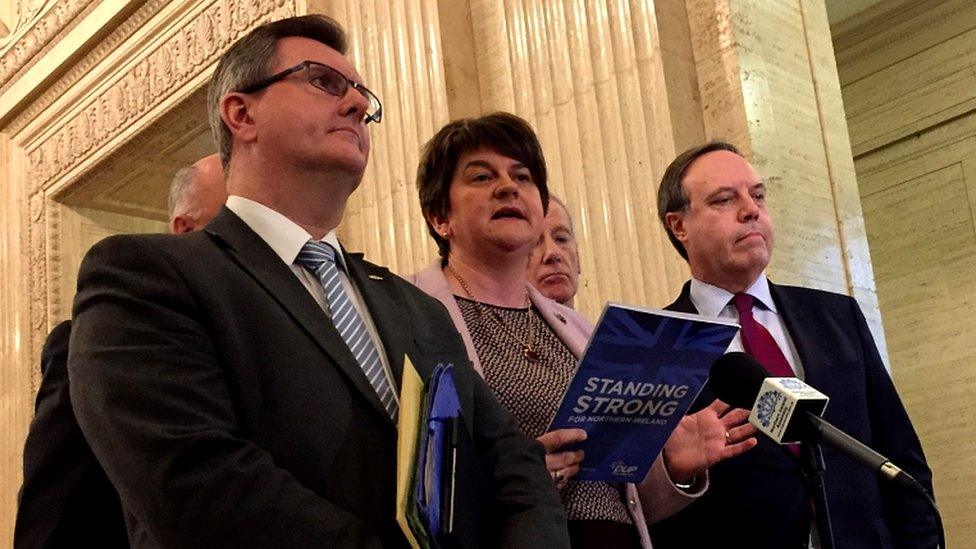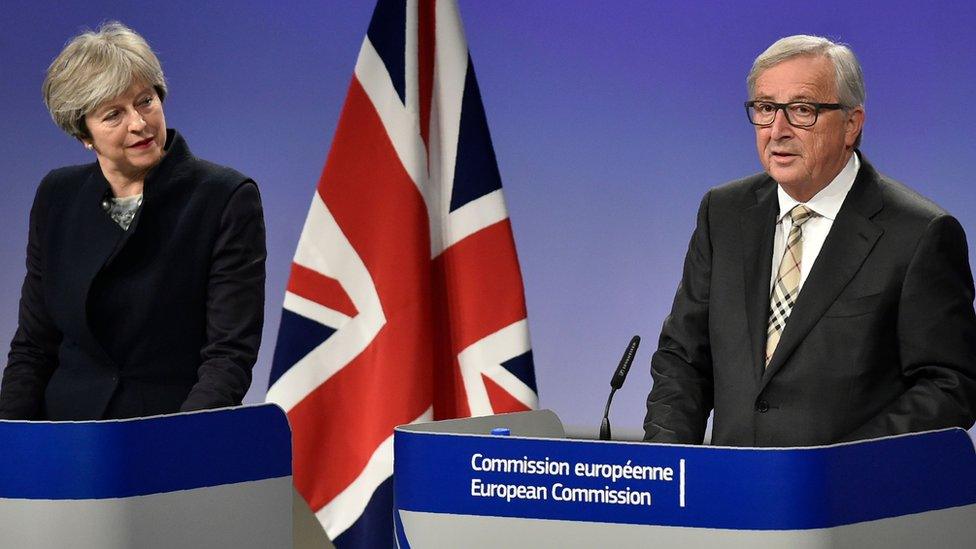How does government get out of Brexit linguistic hole?
- Published

DUP leader Arlene Foster last week declared that her party was "in constant contact" on Brexit issues with the government
"Rubbish" - the response from a senior DUP source when I put it to them that the party had been kept in the loop about Theresa May's Brexit deal, but got cold feet when the likes of Nicola Sturgeon, Carwyn Jones and Sadiq Khan started demanding the same special treatment for Scotland, Wales and London.
Something doesn't add up.
Last Thursday, DUP leader Arlene Foster declared that her party was "in constant contact on these issues with the government".
Was that via face-to-face meetings of the two parties' "co-ordination committee", or just via telephone conversations? If the latter, the line must have been very crackly.
But also last Thursday, the DUP loudly and publicly denounced a report in The Times which talked about the devolution of extra powers to Stormont and hinted at the possibility of customs convergence.
It wasn't exactly what the Eurocrats were working on in their draft texts.
However, the similarity of the proposals and the vehemence of the DUP reaction should surely have alerted the negotiators to sound out the DUP first, rather than bouncing them into accepting a fait accompli.
Raiding a thesaurus
How to get out of this hole?
The diplomats could try raiding a thesaurus to find synonyms for "regulatory alignment", although the DUP will now be on their guard for any cosmetic change which does not alter the thrust of the draft UK-EU agreement.
Earlier, another DUP source told me unionists just wanted to be treated the same as the rest of the UK. If regulations on animal health or agriculture are good enough for Northern Ireland, went the argument, then why not for the UK as a whole?

Negotiations between the UK and UK broke up without a deal on Monday
The DUP's critics are quick to point out that the party has been prepared to contemplate different regimes for corporation tax, air passenger duty and water charges. Not to mention that it doesn't back a "one-size-fits-all" UK-wide policy on abortion or same-sex marriage.
Putting all that to one side for the purpose of this Brexit negotiation, one obvious way to resolve the current conundrum might be for the government to pledge that any "regulatory alignment" between Northern Ireland and the European Union will also apply across the UK.
Such a wider east-west deal would not offend the DUP's unionist sensibilities, although it might create tensions between Theresa May and some of her Conservative Brexit purists.
Call of duty
So you could widen out the deal. However, another approach might be to narrow down its terms.
The draft text referred to "regulatory alignment" in areas relevant to the Good Friday Agreement (the 1998 deal that brought to an end the 30 years of sectarian conflict in Northern Ireland).
That is open to interpretation - some say the EU provided the entire context in which the 1998 Agreement was negotiated. By contrast the UK Supreme Court ruled that Brexit was not in breach of the Agreement.
We have had north-south "areas of cooperation" for the past 19 years.
Transport is one of them, but drivers still need to stick to speed limits in kilometres south of the border and in miles per hour on the north.
Tourism is another area of cooperation, but airport bosses in Northern Ireland will remind you that their passengers pay duty which the Irish Republic abolished some time ago.

Tourism is one key area of north-south cooperation
So simply saying the magic words "Good Friday Agreement" doesn't mean every rule and regulation has to be the same.
Two different forms of words are now doing the rounds.
Leaks from Brussels on Monday claimed a draft text said: "In the absence of agreed solutions, the UK will ensure that continued regulatory alignment with those rules of the internal market and the customs union which, now or in the future, support north-south cooperation and the protection of the Good Friday Agreement."
This would be open to the UK government to parse on the grounds of which rules are relevant to that agreement.
Wider playing field?
The Irish Times has reported another formula which has apparently been disputed by the British government.
It says: "The UK remains committed to protecting north-south co-operation and a guarantee to avoiding a hard border.
"The UK's intention is to achieve these objectives through the overall EU-UK relationship.
"Should this not be possible, the UK will propose specific solutions to address the unique circumstances of the island of Ireland.
"In the absence of agreed solutions, the UK will maintain full alignment with the internal market, customs union and protection of the Good Friday agreement."
This appears more a comprehensive text, less open to interpretation and potentially creating an internal customs barrier within a post-Brexit UK.
So does the government widen the playing field across the UK or try to narrow the terms of the text dealing with Ireland?
Either way it's quite a challenge to rescue this deal.